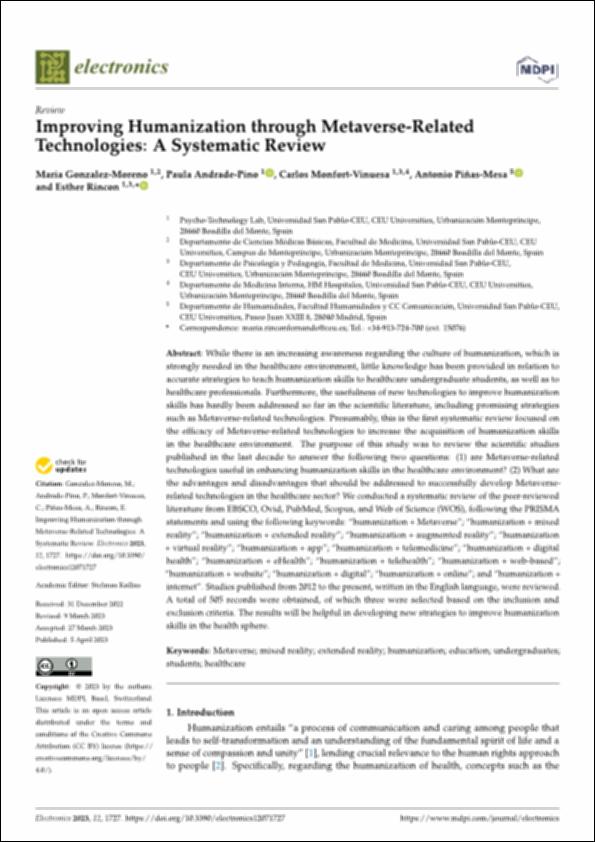Por favor, use este identificador para citar o enlazar este ítem:
http://hdl.handle.net/10637/14873Improving Humanization through Metaverse-Related Technologies: A Systematic Review
| Título : | Improving Humanization through Metaverse-Related Technologies: A Systematic Review |
| Autor : | González Moreno, María Andrade Pino, Paula Monfort Vinuesa, Carlos Piñas Mesa, Antonio Rincón Fernández, María Esther |
| Materias: | Metaverse; Mixed reality; Extended reality; Humanization; Education; Undergraduates; Students; Healthcare |
| Editorial : | MDPI |
| Citación : | Gonzalez-Moreno, M.; Andrade-Pino, P.; Monfort-Vinuesa, C.; Piñas-Mesa, A.; Rincon, E. Improving Humanization through Metaverse-Related Technologies: A Systematic Review. Electronics 2023, 12, 1727. https://doi.org/10.3390/electronics12071727 |
| Resumen : | While there is an increasing awareness regarding the culture of humanization, which is strongly needed in the healthcare environment, little knowledge has been provided in relation to accurate strategies to teach humanization skills to healthcare undergraduate students, as well as to healthcare professionals. Furthermore, the usefulness of new technologies to improve humanization skills has hardly been addressed so far in the scientific literature, including promising strategies such as Metaverse-related technologies. Presumably, this is the first systematic review focused on the efficacy of Metaverse-related technologies to increase the acquisition of humanization skills in the healthcare environment. The purpose of this study was to review the scientific studies published in the last decade to answer the following two questions: (1) are Metaverse-related technologies useful in enhancing humanization skills in the healthcare environment? (2) What are the advantages and disadvantages that should be addressed to successfully develop Metaverserelated technologies in the healthcare sector? We conducted a systematic review of the peer-reviewed literature from EBSCO, Ovid, PubMed, Scopus, andWeb of Science (WOS), following the PRISMA statements and using the following keywords: “humanization + Metaverse”; “humanization + mixed reality”; “humanization + extended reality”; “humanization + augmented reality”; “humanization + virtual reality”; “humanization + app”; “humanization + telemedicine”; “humanization + digital health”; “humanization + eHealth”; “humanization + telehealth”; “humanization + web-based”; “humanization + website”; “humanization + digital”; “humanization + online”; and “humanization + internet”. Studies published from 2012 to the present, written in the English language, were reviewed. A total of 505 records were obtained, of which three were selected based on the inclusion and exclusion criteria. The results will be helpful in developing new strategies to improve humanization skills in the health sphere. |
| URI : | http://hdl.handle.net/10637/14873 |
| Derechos: | http://creativecommons.org/licenses/by-nc-nd/4.0/deed.es OpenAccess |
| ISSN : | 2079-9292 |
| Fecha de publicación : | 5-abr-2023 |
| Centro : | Universidad San Pablo-CEU |
| Aparece en las colecciones: | Psicología |
Los ítems de DSpace están protegidos por copyright, con todos los derechos reservados, a menos que se indique lo contrario.


